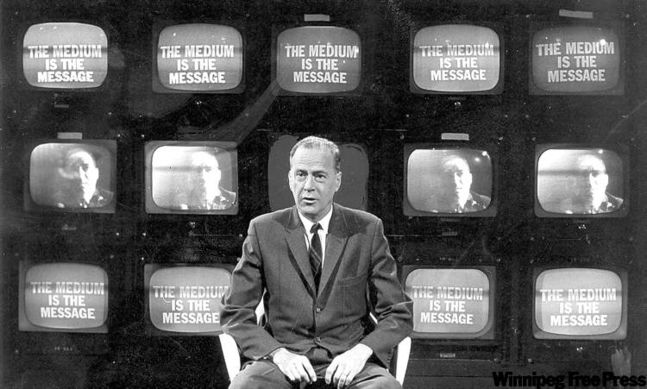The messenger is supposed to bring the truth, not his or her wishes. It was more than 50 years ago when Marshall McLuhan predicted a Global Village, and those who believed the theorist was happy about this development were listening, at best, with one ear. The prospect frightened him.
McLuhan feared the whole world being connected, thought it an invitation for mayhem, rightly believing local skirmishes would be played out on a gigantic stage. Believing a flatter world will be a more peaceful one assumes that everyone is driven by money, not ideology, not madness.
Everything seems to arrive with more speed and regularity now, social justice and sorties alike. The whole world is in you pocket now, and it’s exploding.
Excerpts from 1) Mathieu von Rohr’s Spiegel essay “Apocalypse Now,” and 2) Nicholas Carr’s Rough Type post “The Global Village of Violence.”
From von Rohr:
We are living in an age of shocks and crises that could well be traumatizing in their rapid succession and concentration, since it’s not yet clear whether they’re only a temporary jolt or the beginning of a trend with no end in sight. Of course, the sheer number of conflicts has remained constant in recent years. But there is much indication that we find ourselves in a new era of global instability. The biggest geopolitical stories of our time are the destabilization in the Middle East, the European security order and the European Union. In addition, there has been a societal shift in many Western countries: Many citizens are angry at the elites, because they see themselves as victims of globalization, free trade and migration. This anger has enabled the rise of political movements from the fringe to the mainstream in only a few years: Donald Trump, the Brexit movement, Front National and the Alternative for Germany, or AfD. The classic political camps are dissolving as the battle between the political left and the right is replaced by one between Isolationists and Internationalists.
Every now and then, there are phases in international politics during which more happens in the span of a few weeks than would otherwise happen in decades. Do 2014 and 2016 fall into that category? They’re not comparable to the most dramatic phases of the past century, when both World Wars broke out; nor are they anything like 1989, when the Cold War ended and the world order was rearranged. It’s also unclear whether this year will end with the same chaotic violence it started with.
But it is rather likely that global insecurity will become the new status quo.•
From Carr:
We assume that communication and harmony go hand in hand, like a pair of flower children on a garden path. If only we all could share our thoughts and feelings with everyone else all the time, we’d overcome our distrust and fear and live together peaceably. We’d see that we are all one. Facebook and other social media disabuse us of this notion. To be “all one” is to be dissolved — and for many people that is a threat that requires a reaction.
Eamonn Fitzgerald points to a recently uploaded video of a Canadian TV interview with Marshall McLuhan that aired in 1977. By the mid-seventies, a decade after his allotted minutes of fame, McLuhan had come to be dismissed as a mumbo-jumbo-spewing charlatan by the intelligentsia. What the intelligentsia found particularly irritating was that the mumbo jumbo McLuhan spewed fit no piety and often hit uncomfortably close to the mark.
Early on in the clip, the interviewer notes that McLuhan had long ago predicted that electronic communication systems would turn the world into a global village. Most of McLuhan’s early readers had taken this as a utopian prophecy. “But it seems,” the interviewer says, with surprise, “that this tribal world is not very friendly.”•

